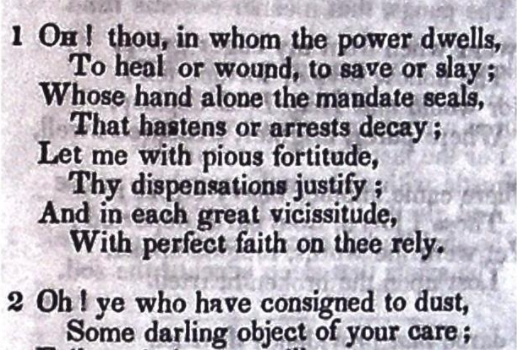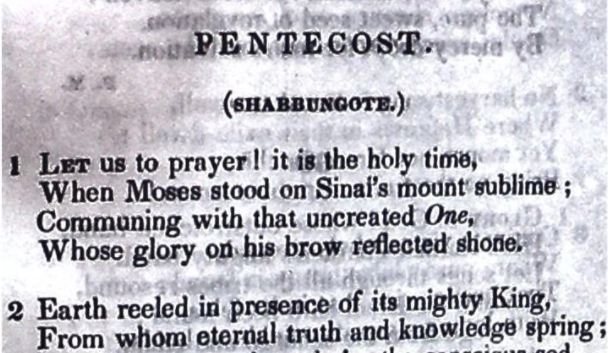Contributor(s): Shared on: 28 October 2021 under the Creative Commons Zero (CC 0) Universal license a Public Domain dedication Categories: Tags: | Contribute a translation | Source (English) |
|---|
|
How beautiful it is to see,
Brethren unite harmoniously!
Of kindred sympathies possest,
By the same joys and woes imprest. | |
But ah! how very slight a cause,
Will counteract kind nature’s laws;
And to that dread estrangement lead,
Against which God and Angels plead! | |
An unkind word, pronounced in haste,
Hath years of tenderness effaced;
Checked confidence, whose genial flow,
Is sweeter than aught else below. | |
In jealousy a poison lurks,
That oft affection’s ruin works;
This first implants suspicion’s seeds,
Arid to fraternal contest leads. | |
Ye brothers, who would cherish strife,
Oh, think of those who gave you life!
By whom ye were together blest,
Watched, prayed for, counseled and carest; | |
What deep reproach to these it bears,
What grief entails on their gray hairs,
When discord on their household band,
Hath laid a cold and with’ring hand! | |
Lord of the universe! we pray,
Thou wilt this evil put away;
And grant that Israel may be found,
In faith by concord ever crowned. |
“How beautiful it is to see,” by Penina Moïse, published in 1842, appears under the subject “Brotherly Love” as Hymn 41 in Hymns Written for the Service of the Hebrew Congregation Beth Elohim, South Carolina (Penina Moïse et al., Ḳ.Ḳ. Beth Elohim, 1842), pp. 44-45. –Aharon Varady Source(s)
 Ḳahal Ḳadosh Beth Elohim (Hebrew: קהל קדוש בית אלהים, also known as Ḳ.Ḳ. Beth Elohim, or more simply Congregation Beth Elohim), founded in 1749 in Charleston, South Carolina, is one of the oldest Jewish congregations in the United States. The founding members of the synagogue were Jews of Spanish and Portuguese descent (Sepharadim), who arrived into Charleston via London, England. Before 1830 Ḳahal Ḳadosh Beth Elohim was a place of worship for Spanish and Portuguese Jews using Portuguese rituals as done in Portugal before the Spanish and Portuguese inquisitions. A splinter group animated by the European Reform movement, the Reformed Society of Israelites, formed in 1824. While at first this group did not succeed in reforming Beth Elohim, by the mid 1830s Beth Elohim had reabsorbed its members and its ḥazzan, Gustavus Poznanski (1804–1879), joined the Reform camp in 1840. After the first synagogue building was destroyed by fire in 1838, it was rebuilt two years afterward (in a Greek Revival style designed by Cyrus L. Warner) with an organ to the chagrin of the traditionalists. Ḳahal Ḳadosh Beth Elohim is recognized as the oldest Reform Jewish congregation in the Americas.  Penina Moïse (1797-1880) was born to a large and wealthy family in Charleston, South Carolina, the progeny of her merchant father, Abraham Moïse (1736-1809), originally from Strasbourg in Alsace, France, and her mother Sarah from the Jewish community on the Caribbean island of Sint Eustatius in the Netherlands Antilles. Her brother, also named Abraham, was a leader in the Reformed Society of Israelites, and so we imagine she was closely associated with the reformist wing of the congregation it wished to and ultimately succeeded in reforming, Ḳ.Ḳ. Beth Elohim. Moïse wrote at least 187 prayers for Beth Elohim's hymn books published in 1842 and in 1856. Moïse was also a gifted teacher and, in 1845, became head of Beth Elohim’s religious school. Moïse was a prolific writer, earning praise for her 1833 collection of poems, Fancy’s Sketch Book, as well as her articles for various newspapers across the country. After the Civil War, she returned to Charleston and ran an academy with her sister and niece. Though her eyesight eventually deteriorated into blindness, she continued to work and write until the end of her life. (This short biographical sketch includes material adapted from her entry in the Jewish Women's Archive by Jay M. Eidelman.) Aharon Varady (M.A.J.Ed./JTSA Davidson) is a volunteer transcriber for the Open Siddur Project. If you find any mistakes in his transcriptions, please let him know. Shgiyot mi yavin; Ministarot naqeni שְׁגִיאוֹת מִי־יָבִין; מִנִּסְתָּרוֹת נַקֵּנִי "Who can know all one's flaws? From hidden errors, correct me" (Psalms 19:13). If you'd like to directly support his work, please consider donating via his Patreon account. (Varady also translates prayers and contributes his own original work besides serving as the primary shammes of the Open Siddur Project and its website, opensiddur.org.) Read a comment / Leave a comment (moderated) Works of related interest: |












Leave a Reply